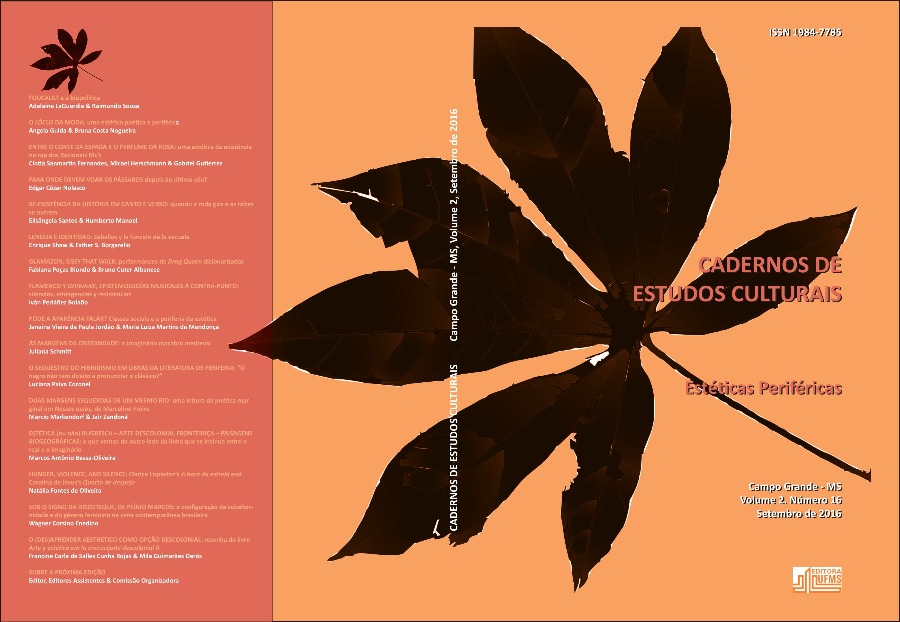HUNGER, VIOLENCE, AND SILENCE: Clarice Lispector’s A hora da estrela and Carolina de Jesus’s Quarto de despejo
Resumen
Clarice Lispector (1925-1977) and Carolina Maria de Jesus (1914-1977) are two women authors who changed the face of Brazilian literature through their unique literary voices. Clarice Lispector’s most violent and last published work is A Hora da estrela (1977), a novel told by a third person male narrator that depicts the life of a poor Nordestina, Macabéa, who moves to the city of São Paulo to search, in vain, for work and a sense of belonging. One of Carolina de Jesus’s most famous published work is Quarto de despejo (1960), written in the format of a diary. The text is narrated by first person narrator, Carolina, and the story portrays the harsh conditions of a single Afro-Brazilian mother living in the slums and working as a paper collector in downtown São Paulo. Despite the common theme of violence and marginality, the reception of each narrative was significantly different. In this article, I juxtapose the two works to rethink their similarities and differences, as well as to problematize their distinct reception by the general public and literary scholars. I further suggest that Lispector’s and Jesus’s literary voices are often appropriated and incorporated into dominant discourses; a case of representational violence. The protagonists of each narrative, Macabéa and Carolina, face physical and psychological violence on a daily basis as they struggle to survive at the margins of society. Despite their difficulties, they fight against victimization and search for their own sense of self. In this sense, through a comparative approach, this article focuses on Carolina de Jesus’s Quarto de despejo and Clarice Lispector’s A hora da estrela to analyze different kinds of violence women face by first, problematizing the representational violence that women authors are submitted to; and second, by discussing the physical and psychological violence the protagonists have to endure as they try to shape their sense of self.
Citas
BEVERLEY, John. Testimonio: On the Politics of Truth. Minneapolis: U of Minnesota P, 2004.
CHOW, Rey. Postcolonial Visibilities: Questions Inspired by Deleuze’s Method. Ed. Simone Bignall and Paul Patton. Deleuze and the Postcolonial. Edinburgh: Edinburgh U P, 2010.
CIXOUS, Hélène. Coming to Writing and Other Essays. Trans. Sarah Cornell et al. Ed. Deborah Jenson. Cambridge: Harvard U P, 1991.
DELEUZE, Gilles. Crítica e clínica. São Paulo: Editora 34, 2011.
FERACHO, Lesley. Liking the Americas: Race, Hybrid Discourses, and the Reformulation of Feminine Identity. New York: State U of New York P. 2005.
FERREIRA-PINTO, Cristina. Gender, Discourse, and Desire in Twentieth-Century Brazilian Women’s Literature. West Lafayette: Purdue U P, 2004.
JESUS, Carolina Maria de. Quarto de Despejo. 9th ed. São Paulo: Ática, 2010.
JESUS, Carolina Maria de. Child of the Dark: The Diary of Carolina Maria de Jesus. Trans. David St. Clair. New York: E.P. Dutton, 1962.
LEVINE, Robert M., and MEIHY, José Carlos. The Life and Death of Carolina Maria de Jesus. Albuquerque: U of New Mexico P, 1995.
KLOBUCKA, Anna. Hélène Cixous and the Hour of Clarice Lispector. Substance. vol. 23, n.1, p. 41-62, 1994. JSTOR. Web. 15 Nov 2011.
LISPECTOR, Clarice. A Hora da Estrela. Rio de Janeiro: Rocco, 1977.
LISPECTOR, Clarice. The Hour of the Star. Trans. Giovanni Pontiero. London: New Directions Paperbook, 1986.
NOLASCO, Edgar Cezar. Restos de ficção: a criação biográfico literário de Clarice Lispector. São Paulo: Annablume, 2004.
PEIXOTO, Marta. Passionate Fictions: Gender, Narrative and Violence in Clarice Lispector. Minessota: U of Minessota Press, 1994.
PÉRPETUA, Elzira. A proposta estética em Quarto de despejo, de Carolina de Jesus. Scripta, Belo Horizonte, v. 18, n. 35, p. 255-266, 2o sem. 2014.
PÉRPETUA, Elizira. Experiência estética e mídia impressa: O caso Carolina de Jesus. Anais do SILEL. v. 3, n. 1, Uberlândia: EDUFU, 2013.
SPIVAK, Gayatri. “Can the Subaltern Speak?” Marxism and the Interpretation of Culture. Eds. Cary Nelson and Lawrence Grossberg. Urbana: U of Illinois P, 1988. Print.
WOLF, Virginia. A Room of One’s Own. Martino Fine Books, 2012. 1929.

Este obra está licenciado com uma Licença Creative Commons Atribuição-NãoComercial 4.0 Internacional.







